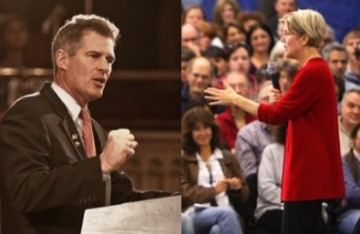MA Senate Race: Jobs vs. Women’s Issues
Saturday, October 13, 2012

The economy is still up for grabs in the highly-contested Senate race. While Brown has pushed for keeping taxes low on small businesses so they can expand and grow jobs, Warren has argued for putting people back to work through federal jobs bills and leveling the playing field by taxing high-income earners.
Two Visions of Job Growth
Warren has said she would have supported the three jobs bills put forward by President Barack Obama that her opponent voted against, illuminating a fundamental difference between the two candidates, according to Morgan Marietta, an assistant professor of Political Science at UMass-Lowell.
While Warren claims that the pieces of legislation Brown voted against were jobs bills, Brown claims that some of them were in fact debt bills. Brown did vote in favor of a jobs bill put forth by Democratic Senate Majority Leader Harry Reid that passed.
"There is a clear trade-off between spending now and paying for it later, between jobs in the near term and debt in the long term," Marietta said.
"Warren argues that the trade-off is worth it, and Brown says it isn't. The winner of that debate will likely win the election."

But Warren can still win the jobs debate by stressing the importance of a strong middle class for an economic turnaround, said Darrell West, vice president and director of Governance Studies at the Brookings Institution.
"It was the wisdom of Henry Ford when he raised salaries for his factory workers that he understood you need people to purchase the products being made."
With consumer spending accounting for 70 percent of the nation's Gross Domestic Product, growth will come from the middle rather than from the top.
"Unless there is a reasonable income distribution, it will be hard to have the consumer demand that will generate long-term economic development," said West.
Social Issues Could Be Tie-Breaker
Yet support for the two competing visions has seemingly remained split. Brown came in ahead by 4 points in a WBUR poll this week, and Warren held a 6-point advantage in a Public Policy Polling survey also released this week.
"There's no question that the economy is the most important issue facing voters," said Jennifer Lawless, director of the Women & Politics Institute at American University.
"But if the candidates are perceived as comparably credible on the issue, or if the voters are split in terms of which candidate and party will move the country forward, create more jobs, and bring down unemployment, then other issues can serve to prop one candidate up over another."

Both Brown and Warren identify as pro-choice candidates. The Republican was quick to call on Missouri Senate candidate Todd Akin to bow out of his own race after he made comments implying that women's bodies can avoid pregnancy biologically in cases of legitimate rape earlier this year.
Brown has also drawn on his personal experiences defending his mother from abusive stepfathers and sharing a home with his wife and two daughters as evidence of his staunch support for women and their rights.
However, Warren has zeroed in on several of Brown's votes in the Senate against bills for such issues as equal pay for equal work and requiring employers to provide contraceptive coverage to their workers.
The Republican defended his votes, arguing that the bills had the right goals but were the wrong implementation. In the case of contraception coverage, Brown said the bill infringed on the rights of religious employers. A similar measure amenable to religious groups was later passed.
"For independent women, a focus on women’s issues – such as access to a wide range of reproductive health options – can tell them a lot about whether the candidates understand women, as well as whether they respect women’s autonomy and equity," said Lawless.
"For Democrats, Warren’s message might serve to mobilize them and ensure that they cast a ballot on Election Day."
Related Articles
- Expert: Focus Will Be on Women in Home Stretch of Mass Senate Race
- 5 Reasons Why Central Mass Will Decide the U.S. Senate Race
- First Brown-Warren Debate: Who Came Out On Top?
- Third Brown-Warren Debate: Who Came Out On Top?
- Negative Attacks Taking Toll On Brown and Warren
- Will Brown Benefit From “New” Romney?




 Delivered Free Every
Delivered Free Every
Follow us on Pinterest Google + Facebook Twitter See It Read It